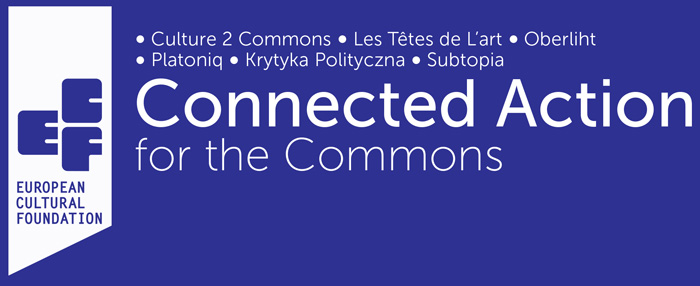CONNECTED ACTION FOR THE COMMONS
Les Têtes de l’Art had been part of the European network Connected Action for the Commons since its creation in 2014 by six European cultural organisations working on the ground.
These six closely-connected organisations benefit from large local, regional and national-scale networks for which they play a head-end role. They work for the defence of art and culture, in the development of today’s Europe and in the democratic processes linked to it.
The European Cultural Foundation (ECF) – one of the oldest independent cultural foundations – initiated the network and supports its development in terms of skills and visibility.
A PERSPECTIVE OF THE PROGRAMME
The Connected Action for the Commons programme has the ambition to promote European newly-emerging forms of citizen cultural cooperation. The alternative practices rely on participation, co-development and democratic resource management. It is known as “commoning”.
Commoning is a collective adventure which aims to change our views on society, by offering an alternative to the usual opposition between state and market economy. It is based on the belief that more equalitarian, sustainable and united societies are achievable.
Through the Connected Action for the Commons network, we defend the essential role of culture in these concepts: its ability to stimulate their development, the sharing of new values through cultural practices and of course, the creation of cultural and intangible products which can then be shared and brought to affect social, economic and environmental aspects of society.
Find out more about the network’s current actions on their blog: Connected Action for the Commons.
THE PROGRAMME’S OBJECTIVES
Several objectives have been set for this programme:
-
Enabling members to disseminate their cultural practices by scaling up.
-
Enabling members to reflect upon their practices and methods by comparing them to others and by setting them into an international context.
-
Structuring a set of claims aiming to raise awareness amongst policy-makers on two points: the need to embed culture as a means to protect the commons and the need to support culture through public policies.
-
Creating an open community of cultural players of the commons in Europe and in neighbouring countries.
-
Promoting visibility of commons initiatives and players
THE PROGRAMME’S INITIATIVES
Through demonstrations such as Idea Camp and the ensuing intellectual work, the network participates in the sharing of ideas amongst Euro-Mediterranean players and in the reinforcement of visibility of the numerous current and future citizen initiatives.
A website dedicated to the network was created in 2016. It exposes the members’ actions and feeds the community with information on cultural commons projects, initiatives and events.
Based on the members’ and their partner’s cultural practices, the ECF regularly publishes documents useful for pleading certain causes and in communication with policy-makers.
We recommend the Build the City manifesto. It introduces 26 projects based on the commons principles and originating from civil society organisations and public bodies partnerships. The examples listed in it show how citizens and public services representatives share the conception and governance and shape the management and legal framing of collective actions or common goods.
On the occasion of the European Commons Assembly, which took place in November 2016 in the European Parliament, the Connected Action for the Commons network launched a new focal point: “Culture and the Commons” which urges European decision-makers to embed culture as an important perspective and practice that contributes to the commons.
THE NETWORKING
The Connected Action for the Commons network consists of:
-
Les Têtes de l’Art (Marseille – France).
-
Culture 2 Commons (Zagreb – Croatia), an alliance between three organisations supporting unconventional culture and the taking into account of the Croatian independent cultural scene: Alliance Operation City, Clubture Network and Right to the City.
-
Platoniq- Goteo (Barcelona – Spain), a crowdfunding platform.
-
KrytykaPolityczna (Warsaw – Poland), an online book and journal publisher, promoting progressive and political culture.
-
Oberliht (Chisinau – Republic of Moldova), a place for thinking and a support organisation for artists working in public spaces.
-
Subtopia (Stockholm – Sweden), an old farming property welcoming companies working in the field of creation.
The variety of its members contribute to the wealth of the project. The six organisations have developed skills and expertise in fields ranging from artists coaching advertising, to digital tool design, along with investigative journalism, artistic work production or publishing, etc. In addition to their diversity, these practices involve extensive collaboration and an appetite for public interest. Some organisations carry out more militant actions and challenge their current political systems, while others work hand in hand with public services in order to raise their awareness on current stakes and needs.
Find out more about the network’s current actions on their blog: Connected Action for the Commons.
IDEA CAMP
Idea Camp is an original yearly event, launched and managed by the European Cultural Foundation (ECF) and by the Connected Action for the Commons network’s six members. Each year, one of these members hosts it.
Idea Camp is an opportunity to publicise some of the most creative and audacious ideas suggested by citizens. The organisers’ ambition is thus to create and support a community of field actors, able to come up with innovative and sustainable responses to current and future changes in our societies.
The organisation of Idea Camp relies on the principle that culture should be open and free. It is an inspiring and reassuring place for sharing, which facilitates the development of ideas, the launching of project collaborations and the emergence of partnerships.
Idea Camp is a place for both meeting other players and work. By attending workshops supervised by the organising team and discussion sessions on the defence of the commons, with experts (known as “Idea Feeders”), the 50 participants are invited to:
-
analyse and develop their ideas
-
share their skills and find new collaborators
-
inspire one another beyond field boundaries
-
investigate and experiment with alternative democratic models









